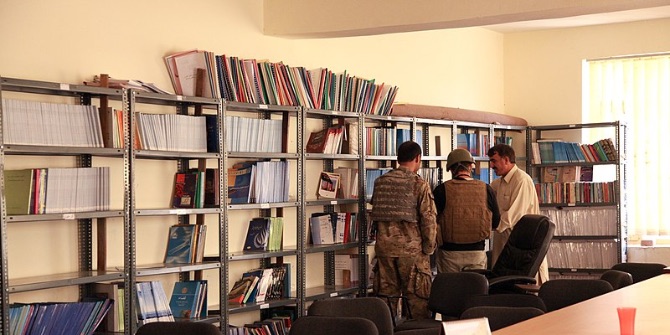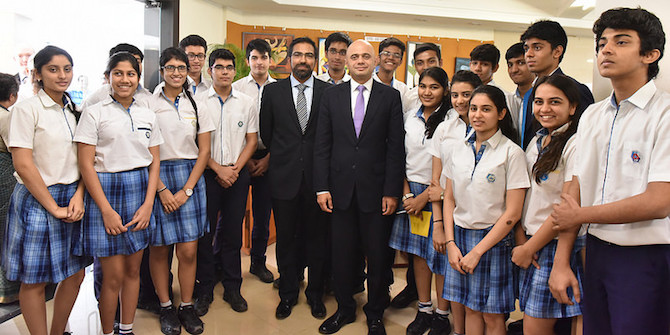LSE’s Matt Birkinshaw learns about water availability in India at IIMB’s annual Policy Hackathon, and calls for more team-based policy jams to promote evidence-based policymaking.
Public policymaking can sometimes seem to reach peculiar conclusions. Solutions can be warped by multiple agendas, over-ambition, and incomplete information before even entering the labyrinth of implementation. What might policy look like free from mundane political struggles? Could bringing fresh perspectives and new ideas lead to creative approaches to ‘wicked problems’?
The Policy Hackathon, a 24-hour, team-based policy re-design competition, held at the Indian Institute of Management Bangalore (IIMB) is one way to find out. Run by the Centre for Public Policy (CPP) at IIMB, one of India’s top business schools, the Hackathon brings together around 80 students and practitioners, including India’s bright young talent from blue-chip IT and consulting firms, NGOs, and research institutes. They are then pitted against each other in a race against the clock to rework public policy using high-quality data-sets, software coding, and critical thinking.
On reaching IIMB’s lush green campus, participants assemble into teams of four or five, take up an existing policy solution from a range of areas, examine the policy text and then compare it with source data, and then attempt to rework an improved solution. Participants enjoy 24-hour access to data sets from the National Sample Survey Organisation (NSSO) and India’s National Census, and mash-up different data sets to notice the relations between variables. Since census data goes down to the household level, participants need to deploy statistical and software coding skills to use it effectively. At the end, participants submit their source code, Excel files, and a completed paper. Teams present their work twice—a 24-hour gap between presentations gives their competitors time to frame difficult questions. The winning team takes home a cash prize of 40,000 rupees (about £400), with second and third place prizes of 20,000 and 10,000 rupees, respectively.
Teams tackle topics such as links between household debt and gold prices, health spending and outcomes, spillover effects of education, development in tribal areas, and access to water. The winning team of last year’s Hackathon noticed a link between liquid petrol gas (LPG) subsidies and urban fuel usage: team members argued that LPG subsidies indirectly benefit the urban middle class because poor people use other types of fuel. Their paper has subsequently been published in the Economic and Political Weekly and is a reference in the new Sen and Drèze book—not bad for 24 hours of work!
This is the second year of the IIMB Policy Hackathon. Organisers Professor Arnab Mukherji, CPP’s energetic young chair, and Sankalp Chhabra, who has past experience organising hackathons, works with HP and has an MBA from IIFT, have been convening similar events for the past four years; Yogi, another Hackathon organiser who is involved with the Bangalore chapter of Random Acts of Kindness, has arranged an annual hackathon with Jaagha and the Centre for Internet and Society on social issues for some time. Yogi tells me how he, Mukherji, and Anant were inspired by a data mash-up in Haiti after the earthquake there in 2010, which combined NASA data with Google maps to calculate the relative chance of landslips and suggest the best sites for rebuilding. Professor Sridhar Pabbisetty, the CPP’s CEO, adds that the event aims to investigate the relationship between policy and data and use a combination of statistics and critical thinking to highlight the importance of building a culture of evidence-based policymaking.
This year, one team of hackers presented their work on sources of water availability, citing water scarcity, privatisation, profiteering, and groundwater depletion as motivations for their focus. Groundwater depletion is a serious issue for the future of Indian cities, but it is not tracked in official data from the NSSO and Census. So the team used groundwater information from the Ministry of Water Resources’ Central Ground Water Board as a supplement. The team noted that water accessibility and availability are not at all the same (see M.H. Zerah’s “Water: Unreliable Supple in Delhi” (2000) for more information on this topic). While the data may show that Indian cities claim 99 per cent water accessibility (meaning that 94 per cent of their inhabitants are within 100 metres of a tap), the actual availability of water in those taps may vary widely.
The hackers argued that policy documents in the water sector do not always account for the quality, source, or availability timings of water. While the majority of India’s population may have access to water on paper, the safety or quality of the water said to be available is not measured. When the team broke down water use by location, treatment, and source type they found that of the 94 per cent connected to the system, only 32 per cent received tap water from a treated source. This suggests that alternative methods of water access are prevalent and raises questions about the effectiveness of a policy focussed on hard infrastructure and formal supply.
While issues surrounding access to water may be a non-issue in the UK, the Hackathon model of team-based, policy ‘jamming’ competitions could be a novel way to generate good solutions for real world problems.
About the Author
Matt Birkinshaw is a PhD candidate at LSE’s Department of Geography and Environment.








1 Comments